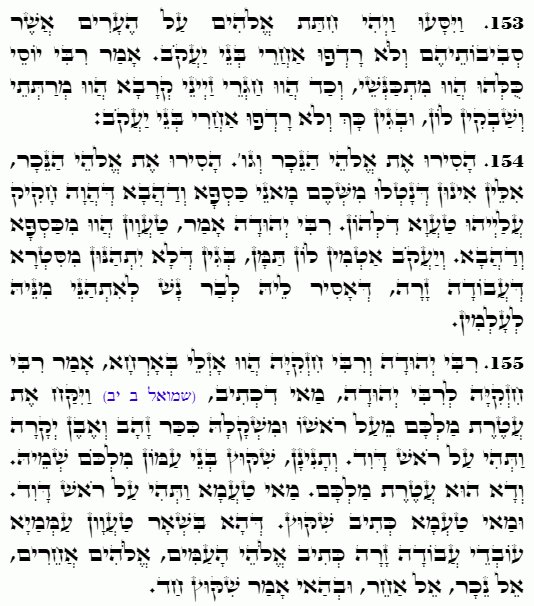Daily Zohar # 4726 – Vayishlach – He took the crown of their king
Daily Zohar 4726

Hebrew translation:
154. הָסִירוּ אֶת אֱלֹהֵי הַנֵּכָר וגו’. הָסִירוּ אֶת אֱלֹהֵי הַנֵּכָר – אֵלֶּה הֵם שֶׁנָּטְלוּ מִשְּׁכֶם כְּלֵי כֶסֶף וְזָהָב שֶׁהָיָה חָקוּק עֲלֵיהֶם עֲבוֹדָה זָרָה שֶׁלָּהֶם. רַבִּי יְהוּדָה אָמַר, עֲבוֹדָה זָרָה הָיוּ מִכֶּסֶף וְזָהָב, וְיַעֲקֹב הִטְמִין אוֹתָם שָׁם כְּדֵי שֶׁלֹּא יֵהָנוּ מִצַּד שֶׁל עֲבוֹדָה זָרָה, שֶׁאָסוּר לְאָדָם לֵהָנוֹת מִמֶּנָּה לְעוֹלָמִים.
155. רַבִּי יְהוּדָה וְרַבִּי חִזְקִיָּה הָיוּ הוֹלְכִים בַּדֶּרֶךְ. אָמַר רַבִּי חִזְקִיָּה לְרַבִּי יְהוּדָה, מַה זֶּה שֶׁכָּתוּב (שמואל-ב יב) וַיִּקַּח אֶת עֲטֶרֶת מַלְכָּם מֵעַל רֹאשׁוֹ וּמִשְׁקָלָהּ כִּכַּר זָהָב וְאֶבֶן יְקָרָה וַתְּהִי עַל רֹאשׁ דָּוִד. וְשָׁנִינוּ, שִׁקּוּץ בְּנֵי עַמּוֹן מִלְכֹּם שְׁמוֹ, וְזֶהוּ עֲטֶרֶת מַלְכָּם. מָה הַטַּעַם וַתְּהִי עַל רֹאשׁ דָּוִד, וּמָה הַטַּעַם כָּתוּב שִׁקּוּץ, שֶׁהֲרֵי בִּשְׁאָר אֱלֹהֵי הָעַמִּים עוֹבְדֵי עֲבוֹדָה זָרָה כָּתוּב אֱלֹהֵי הָעַמִּים, אֱלֹהִים אֲחֵרִים, אֵל נֵכָר, אֵל אַחֵר, וּבָזֶה אָמַר שִׁקּוּץ אֶחָד.
.
Zohar Vayishlach
Continued from previous DZ
#153
Rabbi Yossi said: They all gathered together to fight, and when they girded themselves with their weapons of war, they trembled and abandoned them. Therefore, “they did not pursue the sons of Jacob.”
#154
“הָסִירוּ אֶת אֱלֹהֵי הַנֵּכָר” “Remove the foreign gods” (Genesis 35:2): These refer to the items taken from Shechem—silver and gold vessels that had engraved images of their foreign gods. Rabbi Yehuda said: These were actual foreign gods made of silver and gold, not merely vessels with idolatrous images engraved upon them. Jacob buried them there so that no one would derive benefit from idolatry, for it is forbidden for a person to derive any benefit from it forever.
#155
Rabbi Hezekiah and Rabbi Yehuda were traveling along the way. Rabbi Hezekiah asked Rabbi Yehuda: What is the meaning of the verse, “וַיִּקַּח אֶת עֲטֶרֶת מַלְכָּם מֵעַל רֹאשׁוֹ” “He took the crown of their king from off his head” (2 Samuel 12:30)? We have learned that the idol of the Ammonites was called Milcom, and this is what the verse refers to as “the crown of their king.” Based on this understanding, he asks why the crown was placed on David’s head. And why does the Torah describe this idol as a “detestable thing” (שיקוץ), whereas for the idols of other nations, it refers to them with terms like “אֱלֹהֵי הָעַמִּים” “gods of the nations,” “אֱלֹהִים אֲחֵרִים” “foreign gods,” or “אֵל אַחֵר” “other god,” but here it uniquely uses the term “שיקוץ” (shikutz, “detestable”) for Milcom.
Notes:
The text implies that the crown of an idol (Milcom) was placed on David’s head, which raises questions about how it was permissible for David to benefit from an object associated with idolatry. The term shikutz emphasizes the extreme impurity of Milcom, suggesting that it was viewed as especially detestable, possibly due to its influence or practices. The placement of the crown on David’s head, despite its idolatrous origins, likely signifies a transformation—turning a symbol of impurity into one of divine authority and sanctification under David’s rule. This act could symbolize the subjugation of idolatry and the assertion of monotheism.
{||}

 Previous: Vayishlach
Previous: Vayishlach

